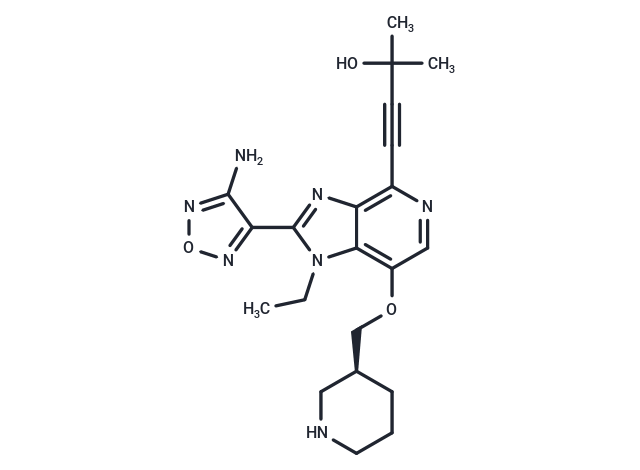Shopping Cart
- Remove All
 Your shopping cart is currently empty
Your shopping cart is currently empty

GSK-690693 is a pan-Akt inhibitor targeting Akt1/2/3 with IC50 of 2 nM/13 nM/9 nM, also sensitive to the AGC kinase family: PKA, PrkX and PKC isozymes. Phase 1.

| Pack Size | Price | Availability | Quantity |
|---|---|---|---|
| 1 mg | $41 | In Stock | |
| 5 mg | $97 | In Stock | |
| 10 mg | $138 | In Stock | |
| 25 mg | $279 | In Stock | |
| 50 mg | $447 | In Stock | |
| 100 mg | $659 | In Stock | |
| 1 mL x 10 mM (in DMSO) | $97 | In Stock |
| Description | GSK-690693 is a pan-Akt inhibitor targeting Akt1/2/3 with IC50 of 2 nM/13 nM/9 nM, also sensitive to the AGC kinase family: PKA, PrkX and PKC isozymes. Phase 1. |
| Targets&IC50 | Akt1:2 nM, PRKX:5 nM, PKCθ:2 nM, Akt3:9 nM, PKCη:2 nM |
| In vitro | GSK690693 exhibits high specificity for Akt isoforms compared to most other kinase families, though it shows lower selectivity for AGC kinase family members, including PKA, PrkX, and PKC isozymes, with IC50 values of 24 nM, 5 nM, and 2-21 nM, respectively. It also effectively inhibits AMPK and DAPK3 from the CAMK family and PAK4, 5, and 6 from the STE family, with IC50 values of 50 nM, 81 nM, 10 nM, 52 nM, and 6 nM, respectively. GSK690693 prevents GSK3β phosphorylation in tumor cells, with IC50 values ranging 43-150 nM, and promotes dose-dependent nuclear accumulation of FOXO3A. It strongly suppresses the proliferation of various cancer cell lines, including T47D, ZR-75-1, BT474, HCC1954, MDA-MB-453, and LNCaP, with IC50 values of 72 nM, 79 nM, 86 nM, 119 nM, 975 nM, and 147 nM, respectively, and induces apoptosis in LNCaP and BT474 cells at concentrations above 100 nM. [1] In alignment with AKT's role in cell survival, GSK690693 triggers apoptosis in sensitive ALL cell lines. [2] |
| In vivo | Administering a single dose of GSK690693 effectively inhibits GSK3β phosphorylation in human breast carcinoma (BT474) xenografts, with its impact varying by dose and time. It also leads to a decrease in phosphorylation of Akt substrates, including PRAS40 and FKHR/FKHRL1. Additionally, GSK690693 causes a temporary spike in blood glucose levels, which normalize within 8 to 10 hours post-administration. This compound not only significantly reduces phosphorylated Akt substrates in vivo but also powerfully restricts growth in various human carcinoma xenografts such as SKOV-3 ovarian, LNCaP prostate, and BT474 and HCC-1954 breast, achieving up to 58% to 75% growth inhibition at a 30 mg/kg/day dosage. Its effectiveness is consistent across different Akt activation mechanisms and notably excels in delaying tumor progression in Lck-MyrAkt2 mice, which express an always-active, membrane-bound form of Akt. |
| Kinase Assay | In vitro kinase assays: His-tagged full-length Akt1, 2, or 3 are expressed and purified from baculovirus. Activation is carried out with purified PDK1 to phosphorylate Thr308 and purified MK2 to phosphorylate Ser473. To more accurately measure time-dependent inhibition of Akt, activated Akt enzymes are incubated with GSK690693 at various concentrations at room temperature for 30 minutes before the reaction is initiated with the addition of substrate. Final reaction contains 5 nM to 15 nM Akt1, 2, and 3 enzymes; 2 μM ATP; 0.15 μCi/μL[γ-33P]ATP; 1 μM Peptide (Biotin-aminohexanoicacid-ARKR-ERAYSFGHHA-amide); 10 mM MgCl2; 25 mM MOPS (pH 7.5); 1 mM DTT; 1 mM CHAPS; and 50 mM KCl. The reactions are incubated at room temperature for 45 minutes, followed by termination with Leadseeker beads in PBS containing EDTA (final concentration, 2 mg/mL beads and 75 mM EDTA). The plates are then sealed, the beads are allowed to settle for at least 5 hours, and product formation is quantitated using a Viewlux Imager. |
| Cell Research | Cells are plated at densities that allow untreated cells to grow logarithmically during the course of a 3-day assay. Briefly, cells are plated in 96- or 384-well plates and incubated overnight. Cells are then treated with GSK690693 (ranging from 30 μM-1.5 nM) and incubated for 72 hours. Cell proliferation is measured using the CellTiter Glo reagent. Data are analyzed using the XLFit curve-fitting tool for Microsoft Excel. IC50 values are obtained by fitting data to Eq, 2.(Only for Reference) |
| Animal Research | Animal Models: Female CD1 Swiss Nude mice injected with LNCaP, SKOV-3, or PANC1 cells, and C.B-17 SCID mice with HCC1954, MDA-MB-453, or BT474 cellsFormulation: Formulated in either 4% DMSO/40% hydroxypropyl-β-cyclodextrin in water (pH 6.0) or 5% dextrose (pH 4.0)Dosages: ~30 mg/kg/dayAdministration: Administered via i.p. |
| Alias | GSK690693 |
| Molecular Weight | 425.48 |
| Formula | C21H27N7O3 |
| Cas No. | 937174-76-0 |
| Smiles | CCn1c(nc2c(ncc(OC[C@H]3CCCNC3)c12)C#CC(C)(C)O)-c1nonc1N |
| Relative Density. | 1.41 |
| Storage | Powder: -20°C for 3 years | In solvent: -80°C for 1 year | Shipping with blue ice. | |||||||||||||||||||||||||
| Solubility Information | DMF: soluble DMSO: 18.33 mg/mL (43.08 mM), Sonication is recommended. | |||||||||||||||||||||||||
Solution Preparation Table | ||||||||||||||||||||||||||
DMSO
| ||||||||||||||||||||||||||

Copyright © 2015-2025 TargetMol Chemicals Inc. All Rights Reserved.